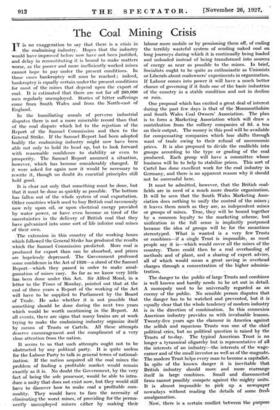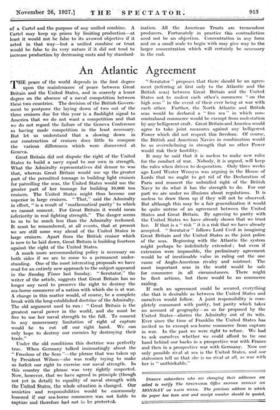The Coal Mining Crisis
It is no exaggeration to say that there is a crisis in the coalmining industry. Hopes that the industry would have improved before now have not been justified, and delay in reconstituting it is bound to make matters worse, as the poorer and more inefficiently worked mines cannot hope to pay under the present conditions. In those cases bankruptcy will soon be reached ; indeed, bankruptcy is equally certain under the present conditions for most of the mines that depend upon the export of coal. It is estimated that there are not far off 200,000 men regularly unemployed. Stories of bitter sufferings come from South Wales and from the North-east of England.
In the humiliating annals of perverse industrial disputes there is not a more miserable record than that of the coal dispute which led to the rejection of the Report of the Samuel Commission and then to the General Strike. If the Samuel Report had been adopted bodily the coalmining industry might now have been able not only to hold its head up, but to look forward with reasonable confidence to stability or even to prosperity. The Samuel Report assumed a situation, however, which has become considerably changed. If it were asked for again now it would be necessary to rewrite it, though no doubt its essential principles still hold good.
It is clear not only that something must be done, but that it must be done as quickly as possible. The bottom has fallen out of the whole system of coal exportation. Other countries which used to buy British coal ravenously now rely upon oil, or upon electrical energy provided by water power, or have even become so tired of the uncertainties in the delivery of British coal that they have galvanized into some sort of life inferior coal mines of their own.
The extension in this country of the working hours which followed the General Strike has produced the results which the Samuel Commission predicted. More coal is produced for export than can be absorbed, and prices are hopelessly depressed. The Government professed some confidence in the Act of 1926—a shred of the Samuel Report—which they passed in order to make amal- gamation of mines easy. So far as we know very little has been done under this Act. Sir Alfred Mond, in a letter to the Times of Monday, pointed out that at the end of three years a Report of the working of the Act will have • to be supplied to Parliament by the • Board of Trade. He asks - whether it is not possible that something should be done during the next two years which would be worth mentioning in the Report. At all events, there are signs that many brains are at work trying to make the coalmining industry organize itself by means of Trusts or Cartels; All these attempts deserve encouragement and the compliment of a very close attention from the nation.
It seems to us that such attempts ought not to be obstructed by any political party. It is quite useless for the Labour Party to talk in general terms of national- izatiori. If the nation acquired all the coal mines the problem of finding a profitable market would remain exactly as it is. No doubt the Government, by the very fact of being the sole possessor, would be able to intro- duce a unity that does not exist now, but they would still have to discover how to make coal a' profitable com- modity. They would have to face the necessity of eliminating the worst mines; of providing for the perm- nently unemployed miners either by making 'their labour more mobile or by pensioning them off, of ending the terribly wasteful system of sending naked coal on long journeys during which it is continually being loaded and unloaded instead of being transformed into sources of energy as near as possible to the mines. In brief, Socialists ought to be quite as enthusiastic as Unionists or Liberals about coalowners' experiments in organization. If Labour comes into power it will have a much better chance of governing if it finds one of the basic industries of the country in a stable condition and not in decline or ruin.
One proposal which has excited a great deal of interest during the past few days is that of the Monmouthshice and South Wales Coal Owners' Association. The plan is to form a Marketing Association which will draw a contribution from the colliery companies of 8d. a ton on their output. The money in this pool will be available for compensating companies which lose shifts through want of trade owing to their refusal of uneconomic prices. It is also proposed to divide the coalfields into groups according to the type or grading of the coal produced. Each group will have a committee whose business will be to help to stabilize prices. This sort of Cartel has done excellent work for the coal industry in Germany, and there is no apparent reason why it should not be successful here.
It must be admitted, however, that the British coal- fields are in need of a much more drastic organization.
It will be seen that the South Wales Marketing Asso- ciation does nothing to unify the control of the mines ; it leaves them much as they are, as independent mines or groups of mines. True, they will be bound together by a common loyalty to the marketing scheme, but unification in the full sense is implicitly postponed because the idea of groups will be for the meantime stereotyped. What is wanted is a very few Trusts or combines—if a single Trust is impossible, as most people say it is—which would cover all the mines of the country. There could then be a real overhauling of methods and of plant, and a sharing of expert advice, all of which would mean a great saving in overhead charges through a concentration of the higher adminis- tration. • The danger to the public of large Trusts and combines is well known and hardly needs to be set out in detail.
A monopoly used to be universally regarded as an enemy of the public. No sensible person disputes that the danger has to be watched and prevented, but it is equally clear that the whole tendency of modern industry is in the direction of combination. In this connexion American industry provides us with invaluable lessons.
Twenty-five years ago the clamour in America against the selfish and rapacious Trusts was one of the chief political cries, but no political question is raised by the Trusts of to-day. The typical American Trust is no longer a tyrannical oligarchy but is representatiye of all the interests of an industry—the interests of the wage- earner and of the small investor as well as of the magnate.
The modern Trust helps every man to become a capitalist. In spite of the known danger it is inevitable that British industry should more and more rearrange itself in large combines. Small and disconnected firms cannot possibly compete against the mighty units. It is almost impossible to pick up a newspaper nowadays without reading the details of some fresh amalgamation.
-Now, theie is a certain- tonffiet - between the purpose of a Cartel and the purpose of any unified combine. A Cartel may keep up prices by limiting production—at least it would not be false to its avowed objective if it acted in that way—but a unified combine or trust *mild be false to its very nature if it did not tend to increase production by decreasing costs and by standard- ization. All the American Trusts are tremendous producers._ Fortunately in practice this contradiction need not be an objection. Concentration in any form and on a small Seale 'to begin with may give way to the larger concentration which will 'certainly be necessary in the end. •























































 Previous page
Previous page